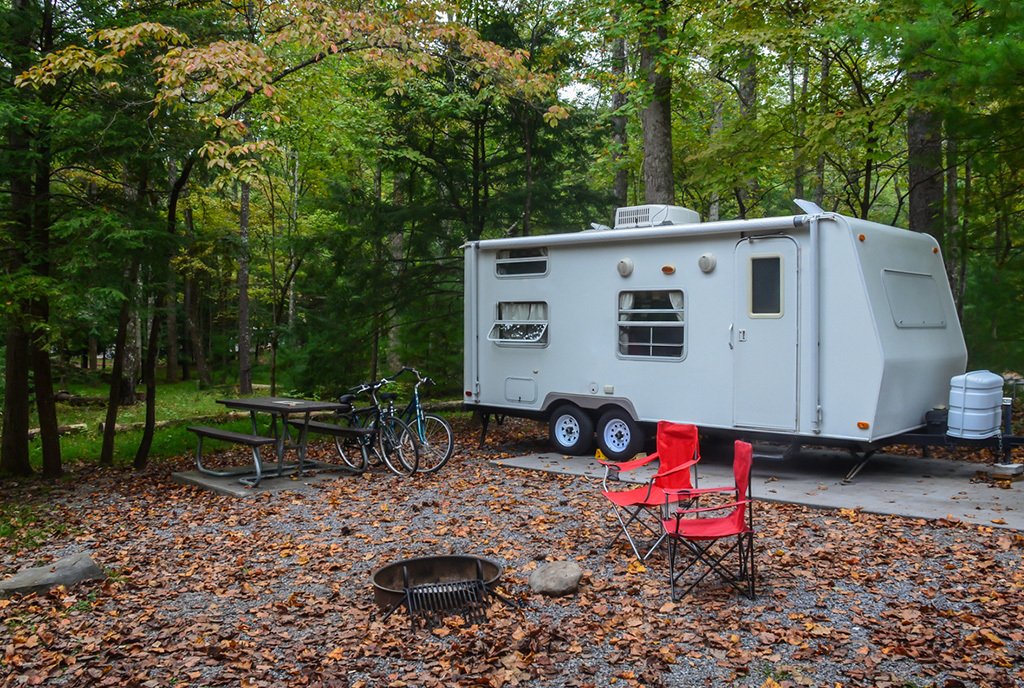
In May 2023, US Forest Service officers pulled up to two camper trailers owned and occupied by three members of the Roberts family who were living together on federal land—in a state forest overseen by the US Forest Service—without permission. Despite multiple warnings, fines, and legal notices directing them to leave, they had stayed because they were otherwise homeless.
The officers were there to arrest the whole family—Judy Roberts, the family matriarch, and her two sons, Brooks and Timber Roberts—for misdemeanor violations related to overstaying their welcome on federal land.
But the officers’ intent was concealed: the three Forest Service agents were operating undercover, dressed in civilian clothes, and posing as ordinary people who needed to jump-start their vehicle. Surrounding the trailer, hidden in the forest just behind the tree line, were more armed officers of the FBI and State Police. In total, more than a dozen law enforcement officials were waiting, undercover or in hiding, to surprise the Roberts family.
The undercover Forest Service agents got out of the car, knocked on the door of the trailer, and asked for a jump. Timber Roberts offered to assist. As he made his way out of the trailer and to the officers’ vehicle, the plainclothes officers proceeded to handcuff and arrest Timber, who began screaming for help.
Brooks, hearing the screams, thought his brother was being carjacked or worse. He grabbed a small .22 revolver and exited the camper in his wheelchair, to which he’d been confined for the better part of a year since a work accident left him disabled.
Without announcing or identifying themselves, the officers opened fire on Brooks in his wheelchair, firing at least a half dozen shots at the man, possibly double that number, as he collapsed prostrate and covered in blood on the ground.
Brooks, 39, is now permanently paralyzed from the waist down due to the injuries.
The chain of events that led to this tragedy, captured on shocking body camera footage reviewed by NPQ, began not with the pursuit of criminals but with the criminalization of homelessness itself, say advocates for the Roberts family and those experiencing homelessness.
“The Roberts family’s only real ‘crime,’ if any, was surviving in the face of poverty.”
A Broader Crisis: Criminalizing Homelessness
Homelessness is, of course, a national problem with broad scope. According to the National Alliance to End Homelessness, homelessness reached record highs in the United States in 2022, affecting over 500,000 people.
Punitive actions against homeless encampments are not uncommon—and are on the rise in many major US cities (San Francisco, Boston, St. Louis, Los Angeles, and Washington, DC, have made headlines for such actions recently, to name a few).
But the Roberts family’s plight sheds light on enforcement actions against people experiencing homelessness outside of cities that get far less attention, even as they occur frequently.
While many enforcement actions are being carried out by local law enforcement, the Roberts’ tragedy, which occurred at the hands of federal law enforcement agents, is a stark example that would seem to fly in the face of recent guidance from the White House discouraging the use of heavy-handed tactics by federal and local authorities alike, favoring treating homelessness as a series of problems to be addressed with support and aid, rather than as a series of violations to be met with enforcement.
“The Roberts family’s only real ‘crime,’ if any, was surviving in the face of poverty and homelessness,” wrote attorneys for Brooks Roberts in a recent legal filing seeking damages. “No humane government would have turned to forcible and violent arrest to punish a family like the Robertses for trying to survive and stay together.”
A Cautionary Tale
The tragedy that played out for the Roberts family might be seen as a cautionary tale of the degree to which the simple fact of becoming homeless can steer a family toward direct, and in this case violent, confrontation with law enforcement.
Before they were living in two campers on federal public land, the Roberts family shared an apartment in Emmett, ID, where Judy Roberts worked in a factory. After a car accident left her disabled, Judy lost her job and was unable to pay rent. The family was evicted and became homeless.
With nowhere else to go, they took the only housing they had—two campers—and moved onto a series of stops on federal public land managed by the Bureau of Land Management (BLM) and the US Forest Service. It was a desperate step for the family but not an entirely uncommon one. Years of reporting has documented the rise of families living on public land.
A 2015 study by the US Forest Service notes:
National forest law enforcement officers regularly encounter “nonrecreational” campers whose tenure exceeds established stay limits (generally 2 weeks). Some long-term occupants are homeless and seek use of the forest as a temporary or long-term residence.
The Roberts family had been trying to comply—moving every couple of weeks—says Brooks’ attorney, Craig Durham. But as moving within the ever-tightening guidelines became increasingly untenable for the family, they began to stay put for longer durations, with fines and penalties rapidly piling up against them.
Still, the notices to leave piled up as the Roberts family fell into deeper and deeper crisis.
Sign up for our free newsletters
Subscribe to NPQ's newsletters to have our top stories delivered directly to your inbox.
By signing up, you agree to our privacy policy and terms of use, and to receive messages from NPQ and our partners.
“Lacking necessities, they struggled, often hungry and baking in the tin cans that were their shelter,” wrote Brooks’s attorneys. “A local nonprofit, CATCH of Boise, began assisting them by providing them with food and water.”
By February 2023, the family had been charged with multiple misdemeanors related to staying on federal land longer than allowed. Prosecutors indicated they would seek jail time.
Exactly what prompted law enforcement authorities to plan the covert, multiagency operation to arrest the Roberts is unclear: the Robertses had been notified of the charges against them and, being indigent, had been appointed attorneys to defend them in court.
Nevertheless, on May 19, armed officers arrived undercover to arrest the entire family, starting with Timber, who left the camper to assist what he thought were ordinary civilians in need of a jump start—only to be handcuffed.
What happened to the Roberts family was not a fluke, but a symptom of a system that continues, despite federal guidance to the contrary, to treat homelessness like a violation to be punished by force.
The entire incident was captured on body camera footage obtained by Brooks’s lawyers, which shows the arresting officers joking in their vehicle before staging the covert arrest.
What followed next, also captured on film and reviewed by NPQ, is described in a legal filing on behalf of Brooks:
Hearing the screams of his brother, Brooks grabbed a small .22 revolver in the R.V., opened the door and jumped into his wheelchair. He wheeled toward where he heard the screaming…as Brooks rounded the corner of Judy’s truck, undercover officer Rupel, without warning or identifying himself, immediately opened fire on Brooks. As soon as Brooks realized law enforcement was present, he tossed the gun and fell out of his wheelchair. Waiting a few beats, Officer Lockner then fired repeatedly at Brooks, including while he lay helpless in the mud.
Brooks was shot through his arm, in his armpit, through his back shoulder, the middle of his back and several times in his legs. A bullet pierced his spine and lodged there.
The Roberts family, still facing various charges of overstaying on federal land, remains homeless—they’re currently living in a hotel room, and have launched a campaign to pay for Brooks’s medical expenses.
Bad Public Policy
“[Criminalization] is bad public policy.”
What happened to the Roberts family was not a fluke, but a symptom of a system that continues, despite federal guidance to the contrary, to treat homelessness like a violation to be punished by force, says Eric Tars, legal director of the National Homelessness Law Center.
“This is bad public policy,” Tars tells NPQ. “It’s bad for the homeless people it impacts. It gives them fines and fees that they have to pay off before they can begin saving for a first month’s rent, it creates arrest records and conviction records that can be a barrier to housing, and it can put people in jail.”
Meanwhile, Tars says, “All of this is happening while the federal government itself puts out guidance and incentives stating that law enforcement is not an effective approach to solving homelessness, and that criminalization is unconstitutional and bad policy, and to focus instead on outreach workers, and housing, and services.”
Indeed, the Biden administration’s US Interagency Council on Homelessness has issued new guidelines specifically rebuking the practice of police sweeps of homeless encampments—a policy that was seemingly ignored in the February crackdown by federal and local police of a homeless encampment in Washington, DC’s McPherson Square.
The question of the legality of such crackdowns is very much still in dispute. In 2018, the Ninth Circuit Court of Appeals ruled that prosecuting people for living outdoors when they have no alternative violates the US Constitution’s Eighth Amendment prohibition on cruel and unusual punishment.
But guidance just this month from the same court specified that law enforcement can enforce evictions of individuals who refuse offers of alternative housing—effectively allowing a controversial crackdown on homeless encampments in San Francisco to proceed.
Meanwhile, the Roberts family continues to struggle for their survival, and Brooks Roberts will now require perpetual assistance—assistance of a kind the family, already consigned to poverty, cannot currently afford.
“They’re good people,” says Brooks’s attorney Durham. “They didn’t deserve this.”












